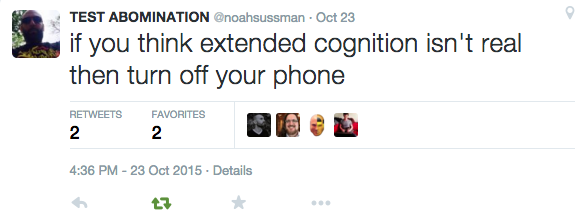This idea has been spinning around my brain the past week. This owes to the idea that we as a species are developing “extended cognition”, as in a part of our brain effort is now residing outside of ourselves. I owe this whole line of thought to Noah Sussman, who made an interesting challenge via Twitter that I cannot stop thinking about:
Two years ago, I could have said “sure, I can do that”. Back then, I had a feature phone, little in the way of frills. My phone was just a phone. Today? I have succumbed to the wiles of the smart phone app world, and truth be told, it has done some amazing things to reshape the way that I interact with the world around me. It has also been a major force for behavior change in me that I had never anticipated it could be. To this idea of extended cognition, I want to suggest that we can outsource other processes our brain controls, specifically motivation and willpower.
The primary focus of this idea for me at the moment is losing weight. There are apps for that. Exercise? There are apps for that. Interacting with wearables to consume data about you and your activities? Yep, there are devices and, guess what, apps for that, too. That’s just the tip of the iceberg, though. There’s the way that the app presents data to the user. There’s the way that the collected data can be shared with others. Communities spring up around each of these apps as well; it’s easy to find yourself immersed in them.
Case in point, I have been using LoseIt for almost two months, and Pacer for two weeks above that. One tracks the calories I consume during the course of the day. The other keeps tracks of my movement and steps. Both programs share data with each other. This helps give me a better picture of what it is I am doing each day. Add a bluetooth scale to the mix, and there’s even more offloading happening. I have willingly, for better or worse, put my personal data about my weight, my food choices, and my activities into an “extended sphere”, and have made the choice to let other people share in that process. If I’m up a few pounds, I get people telling me to not stress over it, to keep at it, and that I’ll be back where I want to be in a short time. If I’m down weight wise, I get virtual high fives and other congratulations, with “keep it up, you’re doing it!” At this time, I don’t personally know any of the people that send me these positive messages. The people I send positive messages to have never met me, either. Still, that level of connectedness, that level of caring about how each other does, and the success we hope to achieve draws us together; it shapes our emotions, and it shapes our efforts. The fact that it’s optimized for mobile means we have the potential to never be without that boost, unless we choose to shut it all down.
Once upon a time, I had to exercise willpower on my own. Now, I’ve offloaded that willpower to my apps, and to the friends that use those apps along with me. Sure, I still am ultimately responsible for what I do, but it’s interesting to see how we tweak our environments to get the approval of our devices (and our virtual companions). Just a few more steps to goal. No, I’ll pass on the raspberry cheesecake, it’ll kick me over my calorie budget. It would be so cool if I could get perhaps one more workout completed today so that I can get a higher calorie adjustment. Would I do this if the accountability were just me and a spiral notebook? I’ve tried in the past, and the answer has been “yes, but for a shorter time”. Considerably less than the consistency I’ve been putting in with these two apps the past ten weeks. I’ve offloaded a lot of the busywork, but I’ve also offloaded the emotions that go with it. I can disappoint myself, but I don’t dare disappoint my phone!
It’s a brave new world we are moving into. The need for memory is diminishing, because our devices allow us extended cognition and external memory. All we need know what to do is know where to look. I think in many ways willpower and motivation are following the same path. The requirement that we be mindful is getting passed down to our devices. Seem far fetched? Give a few weeks of “phone fitness” a try, and then let me know if you are willing to delete the apps and go back to how things were before. For now, I consider myself a beneficiary of extended cognition, motivation and willpower, and I am totally OK with that.
The post Outsourcing My Willpower appeared first on Uncharted Waters.

